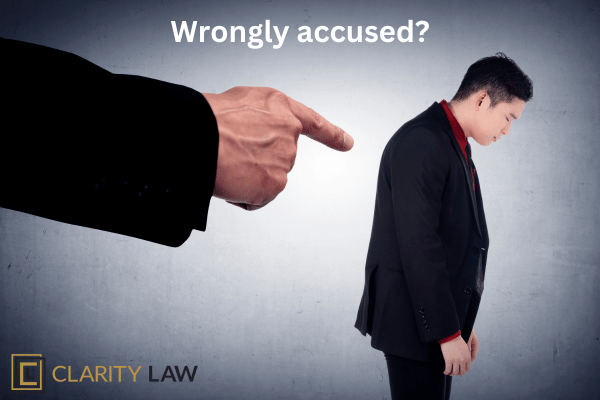
Theoretically, our system of criminal justice is set up to give the best possible chance to an innocent person to avoid a criminal conviction. If you are falsely accused of a crime there are strategies to give you the best defence.
Fundamental Principles
There are a few fundamental principles that are intended to act as safeguards in the event of a falsely accused person. They are called:
- Innocent until proven guilty,
- The burden of proof,
- Proof beyond reasonable doubt.
Innocent until proven guilty.
This means exactly what it sounds like: an accused person is presumed innocent until he is proven guilty of a charge. The prosecution must prove the charge through admissible evidence. This evidence can be witness statements, CCTV, forensics, documentary evidence, photographs, or even the accused person's own confession.
The burden of proof.
The prosecution must prove the charges against the defendant. This is known as the burden of proof, because they have the burden of proving their case. The defendant does not have to prove anything. If the defendant wishes, he can try to set up a positive case proving his innocence. But the jury is not allowed to draw an adverse inference against him if he chooses not to do that.
Proof beyond reasonable doubt.
This means the prosecution must prove their case to such an extent that the jury is left with no reasonable doubt about the person's guilt. It isn’t that the accused might be guilty or is even probably guilty, but the jury must be left without any sensible doubt of their guilt.
Interview
Nine times out of 10, our advice is for you not to give an interview to police. There are various reasons for this. One of the big ones is, if the police don’t have enough evidence, or have very thin evidence, but then you give an interview, there is a possibility you will say something self-incriminating. Most police are seasoned interrogators, and in our experience, it is only on TV programs that a defendant manages to outsmart or bamboozle police in an interview. Think about it: they interview suspects as part of their day job; you may have never even interacted with police before this moment. So, you are already at a distinct disadvantage.
However, there may be rare instances where giving an interview is the right move. You do not want to try this without legal advice and without a lawyer attending with you. For example, if you are accused of being at East Brisbane on the night of the alleged offence, but you can prove you were at Toowoomba that night, then it may be worth confirming that early with police in an interview. But as I said earlier, this would only be in rare cases and after careful consideration with legal advice. There is a chance in giving the interview that police will not choose to charge you because of what you tell them or what you can prove to them.
If you want to learn more see our article on your right to silence.
Negotiations
If you are charged, then the next port of call is to negotiate with the prosecutors. The intention here is to persuade them to drop the charge(s) against you. There are various ways this can be argued: either they have a lack of evidence, or you are able to present evidence that shows your innocence. For example, we had a client who was charged with drink driving. The car was parked in a car park, the client was seated in the passenger seat, and the car was registered to a different owner. We were able to present a statutory declaration from the client’s friend that he in fact drove his car to the location with our client as a passenger, and then left our client in the car while he went and got himself a haircut. Police confirmed the car belonged to our client’s friend, had no evidence that contradicted the friend’s statutory declaration, and therefore decided to drop the charge.
The above is a simple example of negotiations, but the point is they can be essential in getting you out of wrongly laid charges.
Check out our article on negotiating with a prosecutor.
Disclosure
The accused is legally entitled to ask for disclosure from the prosecution. What this means is we will ask the prosecution to provide us with all of the evidence they have in their possession to do with the case, whether helpful to the prosecution or helpful to the defence. Disclosure can include conferencing notes with witnesses, the internal police narrative on their database, criminal histories of prosecution witnesses, among others. With the widespread use of body worn camera footage, this can occasionally be quite helpful for a defendant. It may show a rather different version of events than what is reported in the police version of the facts.
Obtaining disclosure and analysing it carefully is critical, because it can provide an advantage to a defendant for negotiations or for trial. For example, internal police notes may show that their main prosecution witness has made allegations against other people previously and that those allegations had not been prosecuted due to insufficient evidence. Or perhaps a prosecution witness’s criminal history shows they are a person of poor character. Sometimes you might even strike gold with body worn footage and it may capture illegal police conduct which allows for the exclusion of certain evidence.
In any case, in an instance where you are falsely accused of an offence, you want the prosecution to give you everything they have which they say proves their case, so we can search for inconsistencies, or, if they don't have much evidence, then we can start to set up a an affirmative case against their case to make our case look much stronger than theirs.
Trial
Sometimes, despite our best efforts, the prosecution stubbornly presses on with the charges and forces us to take the case to trial. It is an unfortunate reality that they can press on with a weak case right up to the week before a trial. In the meantime, the poor defendant is losing sleep with stress and worry about his fate. Nevertheless, there will be times where an innocent person will have to take the case all the way to the conclusion of a trial. A trial means there will be a judge and jury, and the jury must decide if the defendant is guilty of the offences ‘beyond reasonable doubt’.
For a trial, preparation is half the battle. That means we come to court prepared with a case strategy, with a comprehensive version of your instructions, a carefully constructed case plan which breaks down all the weaknesses in the prosecution case, and ways in which to best exploit those weaknesses. In a sexual assault case, the defence case theory may be “it was consensual”. Then the defence strategy would centre around trying to show that the evidence supports the defence case.
Obviously, every case is different, and it can only really be with expert legal advice and representation that you can properly set yourself up for a trial if you are forced to take it all the way to the end.
Conclusion
The foregoing is only a brief overview of the different things you can do, and the different strategies you can try if you are wrongly accused of an offence. To have the best chance possible, you are going to need experienced lawyers. Clarity Law does no legal aid cases. That mean all attention will be focused on giving you the best defence possible. Our aim will always be to get a favourable outcome without the need of going to trial. But if a trial becomes necessary, then we have the experience to do the best preparation and give you the best chance possible.
How do I get more information or engage you to act for me?
If you want to engage us or just need further information or advice then you can either;
-
Use our contact form and we will contact you by email or phone at a time that suits you
-
Call us on 1300 952 255 seven days a week, 7am to 7pm
-
Click here to select a time for us to have a free 15 minute telephone conference with you
-
Email This email address is being protected from spambots. You need JavaScript enabled to view it.
-
Send us a message on Facebook Messenger
-
Click the help button at the bottom right and leave us a message
We are a no pressure law firm, we are happy to provide information to assist you, if you want to engage us then great, if not then you at least have more information.
Other articles that may be of interest






